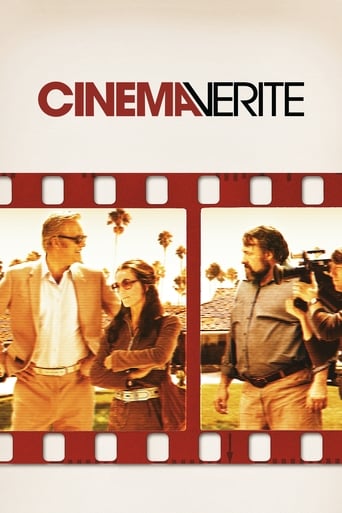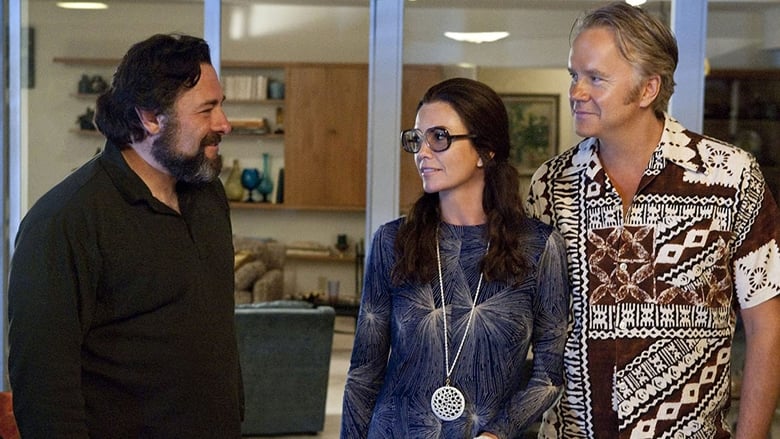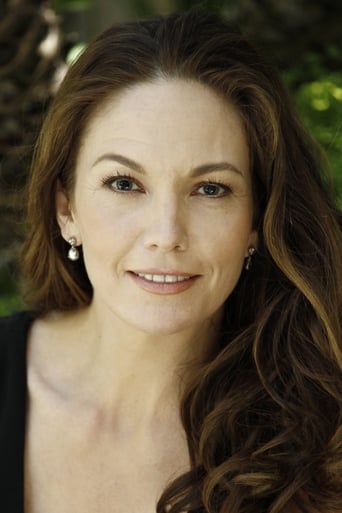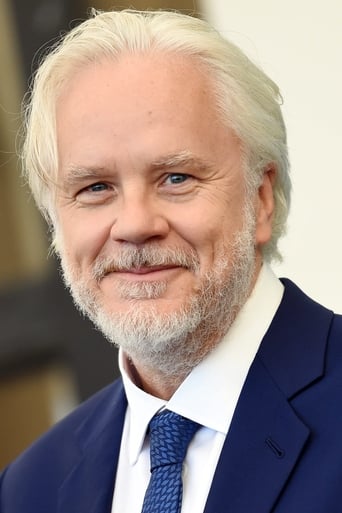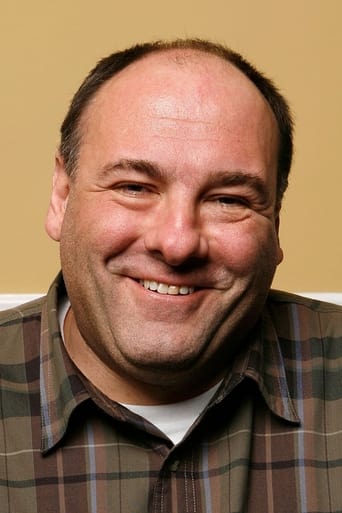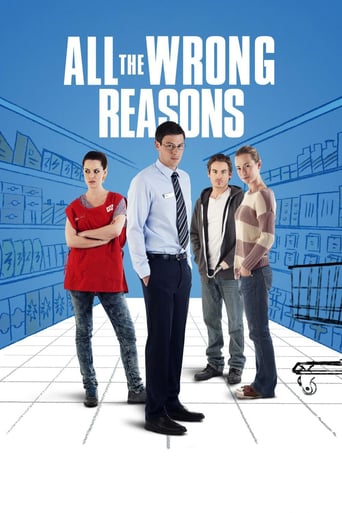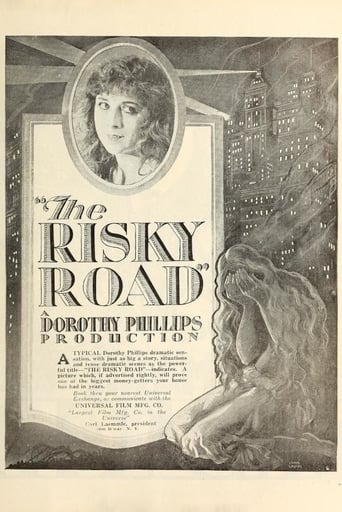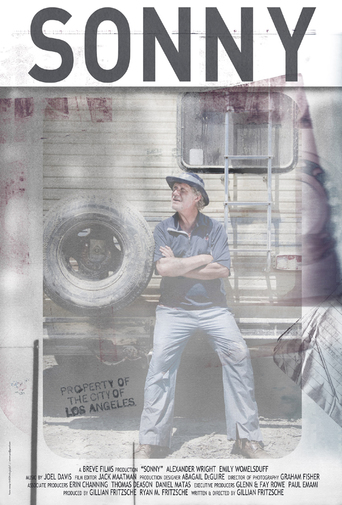Cinema Verite (2011)
In 1973, the Loud family became a television sensation of a new kind. It was long before a metal rock star showed his eccentric family on the small screen and decades before housewives had screaming matches with each other on camera in public. CINEMA VERITE tells the behind-the-scenes story of the groundbreaking documentary "An American Family," which chronicled the lives of the Louds in the early 1970s and catapulted the Santa Barbara family to notoriety while creating a new television genre: the reality TV series.
Watch Trailer
Cast
Similar titles
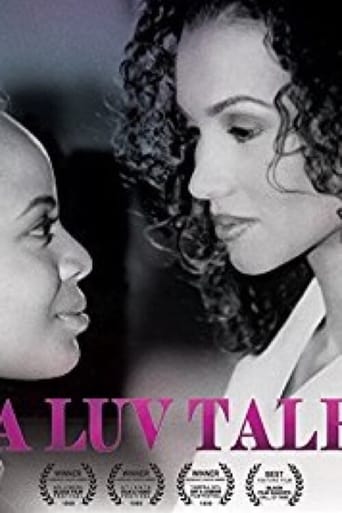
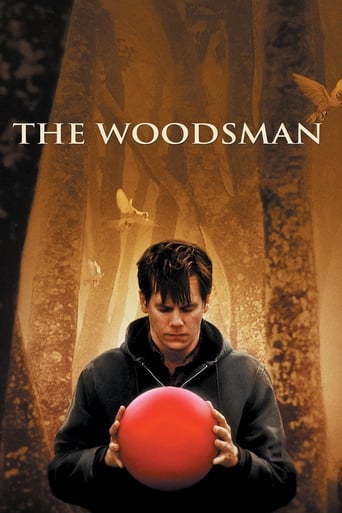
Reviews
Good start, but then it gets ruined
Good movie but grossly overrated
A great movie, one of the best of this year. There was a bit of confusion at one point in the plot, but nothing serious.
It is an exhilarating, distressing, funny and profound film, with one of the more memorable film scores in years,
I wasn't born when the Louds became a major deal in the American public consciousness, as the first sort of "reality" family, but that doesn't matter as I should still be able to take this story on its own terms (for example, what if hypothetically it was all made up, how would it work as a story unto itself). Of course the filmmakers are adept at taking real life and spinning it into docudrama - their breakout sensation was an adaptation of the real life guy who made the comic book American Splendor, Harvey Pekar, which included interviews with the real life subjects - so one would expect this to have some authenticity as it's all about the realm of what is real-real and camera-real. One wonders what the Maysles thought of this filmmaker Gilbert.As it stands this man, played here by the late James Gandolfini (in the kind of performance that makes me miss him all the more, it's largely subtle work until the third act), is not exactly Maysles. I don't know how close they got to their subjects like the Beales (this made me think back to Grey Gardens quite a bit, also a "reality" movie in its way), but with the Louds it was the "All-American Family", and the ideal for Gilbert in the early 70's was to document it in an anthropological sense: what if aliens come down, after all, in a thousand years and want to see what we were like? It's easy to piece that together in drama, but then once you get the philosophies of Marshall MacLuhan into the mix, which this seems to also be alluding to throughout in a subtextual way, being 'natural' is difficult... at first.This story of filmmakers following this family - which includes Tim Robbins and Diane Lane as the seemingly happy married couple of a bunch of interesting, happy kids (including one who is gay but quite happy to be in the scenes of Andy Warhol and the Chelsea Hotel and the like) - is certainly gripping for most of its run-time, and gains traction as the drama unfolds for the family. There's infidelity, there's marital strife, and there's Gilbert (usually in the background) with his cameraman and sound recordist in the house getting it all. Sometimes the family doesn't notice they're there. Then they do, and the looks to the camera give it away (maybe my favorite moment is when Robbins, as he's playing the patriarch in an exceedingly tragic and sad moment, gets a foolish grin on his face as he notices the camera as he's getting in his car - it's perfect, it's just how we all would be in that situation, to hide away the pain).All of the actors can't be faulted in the slightest, and along with Gandolfini and Robbins it's hard to note point out Lane giving one of her best performances in recent memory. But there are times when things seem a little rushed... actually, a lot rushed in the final ten minutes or so, when the series finally airs on PBS and the family has to deal with the fallout. I wish we could see more of this, but the whole movie is only 90 minutes, and after giving us sort of a condensed 'greatest hits' of what this family and the filmmakers went through over several months (almost 80 days to be exact, however over much time I don't know), there seems like it's missing things. I wish there was more there there, and that may be a thing of 'no good movie is long enough' but it's more than that - by the time Cinema Verite wraps up what it has to say, and it's here that the Springer and Pulcini combine the dramatized with the actual of the family on Dick Cavette, it feels a little too little too late.What if it had been more like 'Splendor', with combining the dramatized with the actual footage? Maybe HBO only gave them so much time, but it feels off in that way. But what is here is still mostly substantial for drama and pathos, and they even get us to feel for a character as lousy (at least from what we can see) as Mr. Loude, in part due to Robbins but also just solid writing. On the whole a little simplistically drawn, and at the same time in the small moments it carries a lot of worth. And to think how far we've come... or fallen, I should say, with what people will let themselves be seen as in "reality" television.
In 1973, PBS aired reality show 'An American Family' after filming the Loud family for a year. It's 1971 in Santa Barbara. Filmmaker Craig Gilbert (James Gandolfini) meets Pat Loud (Diane Lane) but she's reluctant at first. Her confident Nixon-supporting often-absent womanizing husband Bill (Tim Robbins) is more interested. They have four kids. Lance (Thomas Dekker) is the gay son in NYC that Bill is still clueless about. Kevin (Johnny Simmons) and Grant (Nick Eversman) have their band. Delilah is the 16 year old having fun. Michelle (Kaitlyn Dever) is the youngest. Newlyweds Susan (Shanna Collins) and Alan Raymond (Patrick Fugit) are filming them.I don't know how much of this has been fictionalized. It feels very over-dramatized. In many ways, this movie is misguided. A film about the Louds would be fine. This is about the show about the Louds. It's the filmmaking and the process behind the scenes that is more important. This is trying too hard to recreate the TV show. The use of the old footage side-by-side with the new footage only re-enforces that idea. It's at best a recreation of the behind-the-scene story. Gilbert's conflict with the Raymonds is probably the best moments of this film. The personal drama of the family is good but without the cameras would be just another personal movie. This should be more about the filmmakers than about the family.
Surprisingly successful HBO film, which takes on the tricky multi-layered task of making a fictionalized docudrama about the making of "An American Family" a 10 hour PBS documentary that was the direct forerunner the surreal and semi-real world of 'reality television' we know today. James Gandolfini plays James Gilbert, who has the brilliant idea to study a 'typical' American Family on film, almost as if it were an archaeological document. But of course no family is 'typical' (particularly the upscale Loud family), and all sorts of sticky moral, ethical and cinematic walls are crashed into. How objective can a documentary really be? What is, or should be off-limits of a prying camera? How much do the personalities and needs of the film-makers effect the behavior and choices subjects, subtly or sometimes very dramatically? It also explores questions about family, as did the original series, but with the value of the passage of years to give context and distance. What is normal? Who are the heroes and villains in the complexities of family life? Are things ever that simple? Why do so many of us want to be seen, known? Or at least think we do? It's very impressive that an 86 minute film can address so many of these questions so intelligently, entertainingly, disturbingly and ultimately movingly. The acting is all solid, with Diane Lane giving what may be the most impressive performance of her career, disappearing into the role of Pat Loud, the confused, self-searching mother. While one could validly argue that there was more to explore (e.g. why was this series such a phenomenon? Why are we so driven to watch the train wrecks of other's lives?) this film does a terrific job of self-awarely playing with multiple layers and meanings of 'reality'. Not least when we briefly see footage of the real family cut in. Not surprising from these filmmakers, who also played with various levels of drama vs. reality so well in "American Splendor".
PBS was a pioneer in many areas of what is seen in television today. The impact "An American Family" had on our culture cannot be measured; it was something like no American audiences had experienced before. The openness of the Louds being themselves on a weekly basis was revolutionary at best. "Cinema Variete" wants to take today's viewers to the story behind the reality show.The ideal American family was found for producer Craig Gilbert by a friend of the Louds, who thought they would be perfect for what the producer wanted to achieve. Pat and Bill Loud had four children and led a comfortable life in Santa Barbara, California. Pat was a woman that exuded intelligence, as noted during her first encounters with Gilbert. She had her doubts about how the program would play, but evidently she thought it would be a great idea, but little did she suspect how it would change her life, and that of her family. Bill Loud was something else, he was a philandering man if he was given the opportunity to have sex outside the home.The film concentrates on the technical aspects more than in the family members. The only one that is showcased was Lance, a young man obviously in awe of himself and his wit. Santa Barbara was perhaps too provincial for him to express his artistic bent, so he fled to New York where he was able to be what he wanted to be in an open atmosphere, away from his parents and small town gossip. The other kids are not even given a thought in the film, even though they were prominently seen in the weekly programs.Robert Pulcini and Sharon Springer Berman share the directorial credit. The screenplay is by David Seltzer who tried to explain the new phenomenon on public television in a film format. Because of the limitations trying to condense the series into something that resemble a movie, the creators only touch on their subject without going too deep behind the real family.Diane Lane's Pat is one of the best things we have actually seen her do in recent memory. Her resemblance to the real Pat Loud is uncanny. Tim Robbins take on Bill is not quite right, although he also resembled the man he is portraying. James Gandolfini plays Craig Gilbert, a man with a vision that revolutionized the way we watched television shows. Thomas Dekker is seen as the flamboyant Lance Loud.
